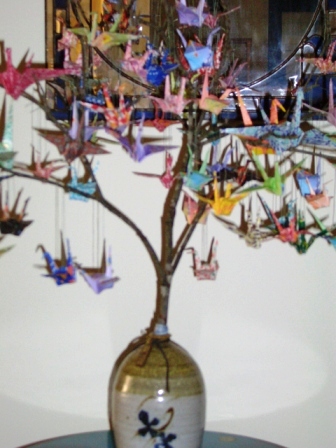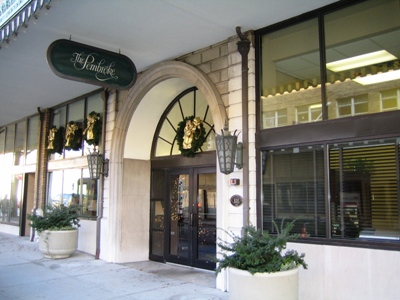|
|
Journal Entries

June, 2010
June 17, 2010 – Sixty-Six Origami Cranes

When I started hanging these cranes on a dogwood branch I picked up in Old Gray Cemetery, I didn't
plan on a certain number, just thought it was a good way to display some of the cranes I had folded. After hanging about fifty,
I realized it seemed right to have one for each year of his life, a kind of memorial. At 66, the tree seems finished.
Cranes have been on my mind, too, because of the BP oil spill in the Gulf of Mexico. It's incredible to think that after WWII
there were maybe 21 whooping cranes in all of North America. Although conservation efforts have increased the population to
around 400 today, they are still endangered. There are only about 120 in the Eastern migratory population and can only be reliably viewed
in three places, refuges in Wisconsin and Florida and wintering grounds along the Texas Gulf coast. I can't imagine seeing a bird with
a 7-ft wingspan. Harder to imagine still that a bird that large can be as fragile as a butterfly where habitat is concerned.
I couldn't believe an oil engineering consultant on NPR sympathizing with oil rigs as if they were a flock of cranes. His best argument
for opposing Obama's six-month moratorium on coastal drilling was that oil rigs are expensive and cannot sit idle that long; a moratorium
would start "a migration of drill rigs out of the Gulf of Mexico." I know his use of the word migration was technically
correct, but it hit a nerve. This guy has had 45 years in the oil industry, sixteen of them working for Shell Oil. That's two-thirds
of his life invested in oil--how could he possibly be objective? His estrangement from nature is representative of the oil
industry as a whole, their sheer arrogance. Talking about oil rigs as if they are the poor things forced to leave because their
habitat has been spoiled. I just wanted to slap him around a few times.
There was an opposing engineer from Alaska, but they didn't give her even half the time they gave him. This was a female whose background
includes over five years with a non-profit watershed protection organization and thirteen years with the Environmental Defense Fund in
D.C. She's currently director of an Alaskan transportation project which promotes policies such as eliminating public subsidies
for roads to mines and oil and gas fields and increasing public transportation, walking, and biking opportunities. And what was NPR's
title for this segment: "Some Experts Call Oil Drilling Moratorium Misguided." And shame on Scott Simon for beginning the
piece with "the cure may be as destructive as the disease." Right. A moratorium is worse than an oil spill bc oil rigs might leave?
It was enough to make one suspect NPR had been paid by the oil industry to slant reporting in its favor.
I can't tolerate too much news, even radio. I have yet to see a visual image of the oil spill; at this point, it might undo me. I remember TV
reports of the Exxon Valdeze devastation and haven't bought Exxon gas since then. But now there's no escaping the fact that I'm just
as culpable as BP--as long as I buy gasoline period, I have no defense. I have a neighbor who doesn't own a car; she uses public transportation.
I'm a moral coward.
I've just finished reading Richard Powers' novel, The Echo Maker. The book was tedious at times because Powers is a little too
obvious in his intellectual cleverness, but it has some lovely passages about sandhill cranes. Here's a sample:
What do birds remember? Nothing that anything else might say. Its body is a map of where it has been,
in this life and before. This time next year it will come back through, pairing off for life. The year after next:
back again, feeding the map to its own new colt. Then one more bird will remember what birds remember.
The yearling crane's past flows into the now of all living things. Something in its brain learns this river,
a word sixty million years older than speech, older even than this flat water. This word will carry when the river is gone.
When the surface of the earth is parched and spoiled, when life is pressed down to near-nothing, this word will start its
slow return. Extinction is short; migration is long. Nature and its maps will use the worst that man can throw at it.
The outcome of owls will orchestrate the night, millions of years after people work their own end. Nothing will miss us.
Hawks' offspring will circle above the overgrown fields. Skimmers and plovers and sandpipers will nest in the thousand
girdered islands of Manhattan. Cranes or something like them will trace rivers again. When all else goes, birds will
find water.
"Extinction is short; migration is long." Yes, and life is short; the journey of a soul is long. Because birds have always
represented the human soul, an origami crane tree seems a perfect memorial, a visual prayer for a safe migration to the next world.
|

 Union
Avenue
Union
Avenue